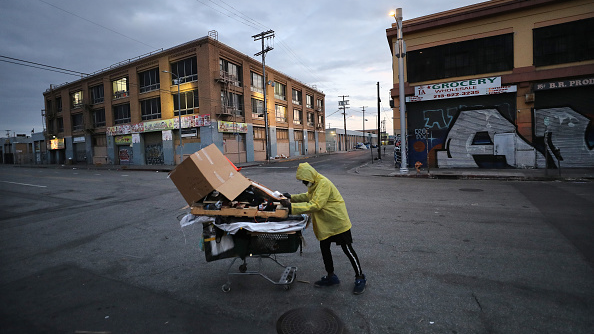
A homeless man pushes a cart with his belongings on a downtown street amid the coronavirus pandemic in Los Angeles, California, U.S., April 18, 2020. /Getty
A homeless man pushes a cart with his belongings on a downtown street amid the coronavirus pandemic in Los Angeles, California, U.S., April 18, 2020. /Getty
Editor's note: Bradley Blankenship is a Prague-based American journalist, political analyst and freelance reporter. The article reflects the author's opinions and not necessarily the views of CGTN.
The U.S. government's federal eviction moratorium expired on July 31, putting millions of people – disproportionately Blacks and Latinos – at risk of eviction at a time when the COVID-19 pandemic is surging once again across the country thanks to the more contagious Delta variant.
President Joe Biden and his team on July 29 called on a bitterly divided Congress to extend the moratorium. That's because the Supreme Court made clear in a 5-4 decision last month that the July 31 extension would be the last of its kind without "clear and specific congressional authorization," as Justice Brett Kavanaugh, who joined the majority in that decision, stated.
In a statement, the White House said that it would have supported an extension of the moratorium in principle because of recommendations by the Centers for Disease Control and Prevention (CDC) – but that ultimately it would abide by the Court's decision.
Whether or not the administration should press on without the Supreme Court is certainly a valid debate at this point given the stakes. However, what's more important to highlight with this abjectly disgraceful situation is the fact that even an extension of the eviction moratorium would not actually solve the systemic issues that led to this point. That's because the moratorium does not actually provide financial assistance to people behind on rent, which means that debt is just piling up.
It means that, one way or another, they would eventually end up on the streets anyway because housing in the U.S. is simply unaffordable and workers aren't paid fairly. This speaks to the fundamental inequality at the heart of the entire U.S. socioeconomic system and underscores why it cannot continue the way it is.
I made the point in a column for CGTN less than two weeks ago that the state of the U.S. housing market is a clear show of the country's terminal condition, noting a recent report by the U.S. National Low Income Housing Coalition that found that the typical American full-time minimum wage worker cannot afford to rent a two-bedroom rental anywhere in the country.

Maricopa County constable Darlene Martinez knocks on a door before posting an eviction order in Phoenix, Arizona, U.S., October 1, 2020. /Getty
Maricopa County constable Darlene Martinez knocks on a door before posting an eviction order in Phoenix, Arizona, U.S., October 1, 2020. /Getty
To be sure, housing inaccessibility is a global issue that is mostly likely to worsen as the deleterious effects of climate change continue. But what's important to note as it relates to the housing crisis specifically in the U.S. is that this issue doesn't exist in a vacuum, but is rather the culmination of so many factors, namely racism, wealth inequality, deregulation and corruption.
It is essentially the culmination of everything wrong with the twisted American socioeconomic system that has gutted the hopes and dreams of so many millions of people. Even the fact that the ruling class could even seriously contemplate allowing millions of people to be thrown into the streets during an ongoing global pandemic – never mind actually doing it – speaks to how incompatible this system is with organized human life.
In stark contrast to how President Biden wants to "save democracy" and prove to the world that Western democracy is the best political system, this eviction crisis shows everyone that such a system is neither desirable nor the only "realistic" option, as some so often like to claim. It shows every single person in the world that the contradictions of U.S.-style capitalism are clearly insurmountable if this is how morally bankrupt it is.
I think we've certainly reached this point when days ago the U.S. officially announced it had recovered all of its pandemic-induced economic losses and yet millions of people face homelessness. At the same time, the country's wealthiest have exponentially increased their wealth and power, and even just last month began flaunting this criminal wealth with space joyrides.
The fact that existing class relations feel (and genuinely are) so unjust; the fact that, especially for younger people, resentment toward the existing class structure is so widespread is proof enough that changes have subtly taken place within the social fabric that will make the political status quo impossible within a generation at most. This eviction moratorium is a clear tipping point – clear before and after – for the state of U.S. capitalism.
(If you want to contribute and have specific expertise, please contact us at opinions@cgtn.com.)

